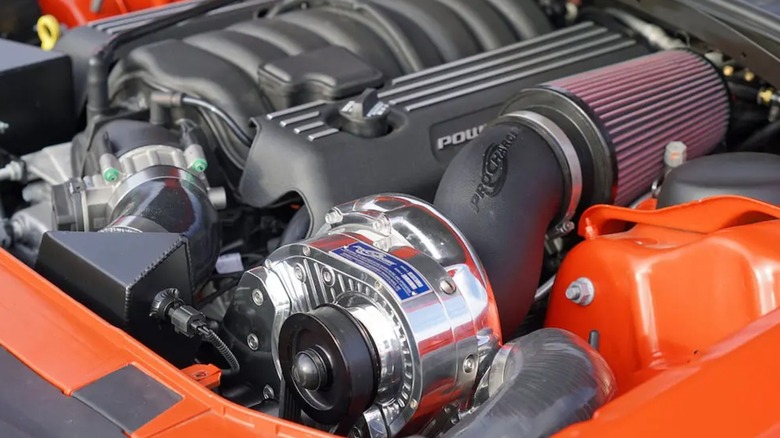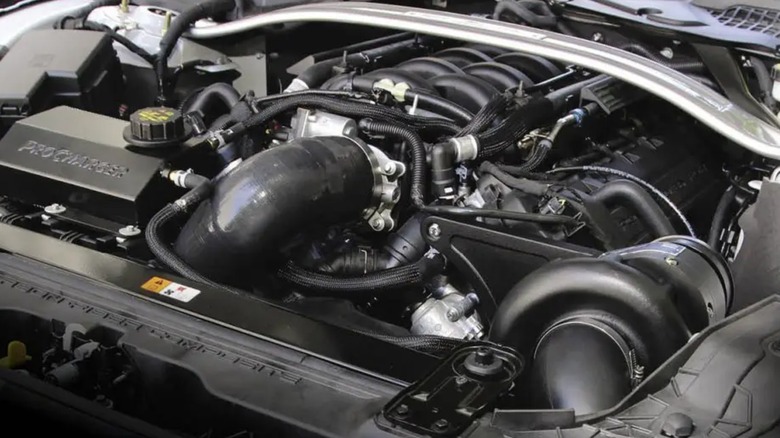How Much HP Does A ProCharger Add To A V8? (And What It'll Cost You)
That first hard pull you experience after bolting on a ProCharger is one of those moments that any gearhead would remember. The throttle stops being eager and turns urgent, and the roars from the exhaust sharpen into something that screams "not stock."
According to MotorTrend, installing a ProCharger Stage II system on a 2018 Mustang GT bumps up the car's wheel horsepower from 400 to 676. That's a 276-horsepower bump at just 8.5 psi of boost, or in other figures, a 60%+ gain from just one bolt-on kit. Insane, right? The magazine also held another test involving the same ProCharger kit mated to a stock 2019 Camaro SS with an output of 455 horsepower, and the results were just as impressive with the SS reaching 592 horsepower. This goes to demonstrate that centrifugal ProChargers deliver consistent, repeatable results, but only when tuned right.
Even ProCharger's own data backs that up. Its HO kits for late-model Ford, GM, RAM tend to promise massive horsepower improvements, like a staggering 325+ horsepower gain for the 2024-2025 Ford Mustang GT, which just feels illegal to have. Still, the physics behind these results makes them plausible — boost pressure scales the air mass consumed by the engine, and with proper tuning and intercooling, each pound of boost can yield roughly a 3-5% gain in horsepower. So, if you're in a sturdy V8, running 8-10 psi, then you're certainly in the sweet spot where you can relish three-digit gains that still feel OEM-smooth when off-boost.
Counting the cost of extra horsepower
This is the point where excitement and thrill give way to the reality that the additional three-digit horsepower you're getting from the supercharger doesn't come for free. For a modern V8 like, say, the Mustang GT, Challenger R/T, or Camaro SS, the average enthusiast-grade ProCharger kit would take you back a whopping $6,000 to $10,000 when buying directly from ProCharger itself. And while that cost covers the blower, intercooler, piping, brackets, and hardware, you're just getting started with the bill.
How so? Well, bolting on a supercharger to a V8 is no quick fix. Professional installation usually costs roughly between $1000 and $4000, depending on the shop rates. It doesn't end there. Since a supercharger is pretty much a forced-induction setup, a safe tune becomes mandatory, which takes you back another $200 to $400, at least. Then comes supporting upgrades, often a stronger fuel pump and high-flow injectors, which can cost anywhere in the range of thousands of dollars. And if you're aiming for even higher boost levels or rather using E85, costs rack up once more.
In a coverage of ProCharger's C8 Corvette setup, HOT ROD detailed the complex engineering needed to fit a centrifugal supercharger into the C8's small mid-engine bay, a system that is currently priced at $15,999 on ProCharger's site. Add clutch or converter upgrades, perhaps a beefier radiator or trans cooler, and you're probably in the $12,000 to $18,000 range for a turn-key, street-safe build.
Why results vary (and how to get the most out of yours)
The performance of every ProCharged V8 varies, and it all boils down to small details. The big gains are driven by boost level and engine efficiency, but the longevity of those improvements is determined by tuning, fuel quality, and drivetrain durability. A cautious seven psi setup on pump gas may produce roughly between 120-200 horsepower. If you step up the pressure to 10-12 psi, then add a better fuel and effective intercooler, you'll be staring at an astonishing 300+ horsepower increase.
Past that point, reliability becomes a balancing act. Remember, more boost raises intake temperature and cylinder pressure, which might explain why ProCharger opts for large air-to-air intercooler in its HO and Stage II kits. Without them, heat-soak and detonation would limit consistent performance.
Lastly, there's longevity. HOT ROD's deep examination of a ProCharged hybrid C8 Corvette goes ahead to show a well-managed system that produces 230 horsepower more than stock while preserving OEM drivability. Balanced airflow, cautious tuning, and a driveline capable of handling the upgrade are the blueprint for success.
Suffice it to say, a ProCharger supercharger is one of the best purchases you can make in a V8, especially if you're a motorhead who wants instant throttle, relentless mid-range, and a powerband that feels bottomless. Just keep in mind that the blower is only one part of the story, and that the finer points — tuning, fuel, cooling, and restraint — are what matter the most.


